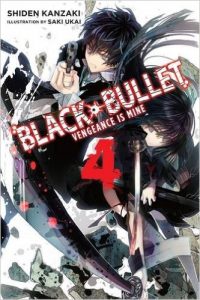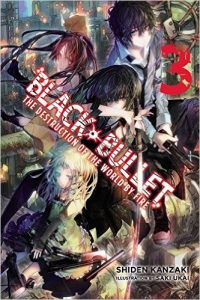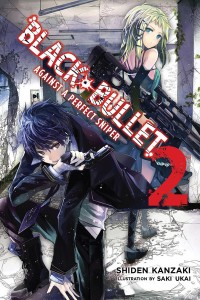By Shiden Kanzaki and Saki Ukai. Released in Japan by ASCII Mediaworks. Released in North America by Yen On. Translated by Nita Lieu.
I’ve talked before about Black Bullet’s flaws – from its shoehorning of “lolicon’ style humor into the text to its simple unrelenting grimness – so let’s try to take this review to talk about what it does well. Because it does do some things very well. Black Bullet has a plan, and that plan is to let you know about the horrors of war. And over the course of this book’s 220-odd pages, you learn over and over again that the noble soldier fighting an unwinnable fight against an unkillable enemy is something that is going to result in hundreds, indeed thousands of casualties. Sometimes, I will admit, Black Bullet overdoes its message – there’s a scene with a cute 8-year-old getting her head cut off that was just so grand guignol it actually turned silly – but for the most part it’s just a sea of horror that hammers its point home nicely.
The other excellent thing in the book, though again it’s hard to enjoy, is Kisara. I had been ready to gripe about her being underused in the volume again, particularly as there were many times when we were told that she was the most dangerous and deadly of them all – including by the resident insane tykebomb – but we still don’t actually see her doing anything, given that for the most part Rentaro is the hero of this series and it follows his POV. And then we get the Epilogue, and boy howdy. Kisara discovers that one of her brothers is, in fact, responsible for the decay of the monument that led to the events of books 3 and 4 in the first place, and duels him. It’s interesting, because the brother is presented to the reader as being a Grade-A snake, horrible and loathsome, and you are totally not wrong to want to see her take him out.
No, the issue is that she takes joy in doing so, and, in her chosen method, drives a (semi) innocent bystander insane. Her glee and delight as she discusses her revenge being started reminds you what the subtitle of this volume was, and you realize that it was about her all along. Rentaro is, of course, shocked, as this is not the Kisara she normally shows to him. In fact, he realizes that one day he may in fact have to be the one to kill her if she keeps going on like this. I’m not sure when that will play out – final book in the series, I’m guessing – but certainly his utilitarian views are at odds with her “only evil can combat evil” revenge fantasy. It’s a stunning final 30 pages or so.
Of course, my own personal tastes remain an issue here too. This is well-written, the lolicon was at a minimum, and I enjoyed its themes and what it’s trying to say. I just hated reading it as a book for pleasure. It’s very good, bordering on excellent, but I felt the opposite of enjoyment. It was a slog. As such, Black Bullet remains a series that’s hard to recommend, though fans of the anime and of ‘grimdark’ style series will get a lot out of it.



